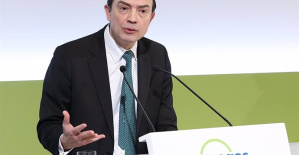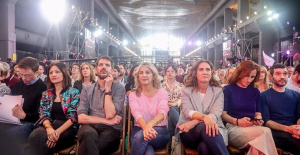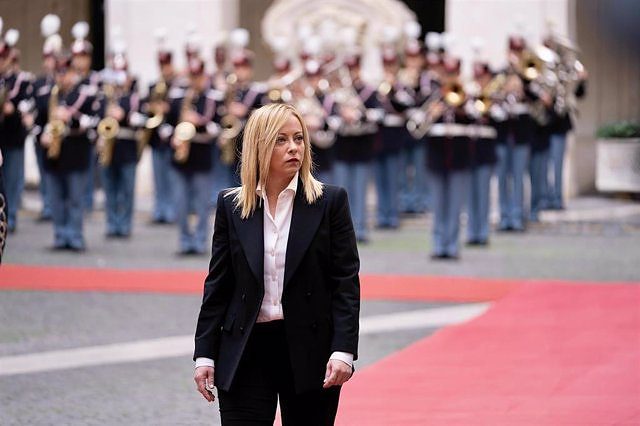The opposition and some media criticize that Meloni uses the masculine for her position, assuring that it is a "political election"
MADRID, 25 Oct. (EUROPA PRESS) -
The new Italian prime minister, Giorgia Meloni, has raised controversy in Italy after announcing that she wants to be called "the prime minister" instead of "the prime minister", betting on a male gender decline instead of a female one.
In the first communiqués issued since its constitution this Sunday, the new Italian government has presented the winner of the elections on September 25 as "the prime minister, Giorgia Meloni".
"The prime minister, Giorgia Meloni, will be in the Chamber of Deputies on Tuesday, September 25, to make statements about his government program," says the latest letter issued by Palacio Chigi.
"Cordial and fruitful conversation, of more than an hour between the prime minister, Giorgia Meloni, and the French president, Emmanuel Macron", reads another of the writings, in this case released after the meeting on Sunday between the leaders of Italy and France .
This decision in the decline of Meloni's post - which in its literal translation into Spanish would be "president of the Council of Ministers" - has not gone unnoticed by the opposition and by the Italian media.
Specifically, the former president of the Chamber of Deputies Laura Boldrini, of the Social Democratic Democratic Party (PD), is among the most critical, wondering if "it is too much" for the leader of the Brothers of Italy (HDI) to use the feminine.
"The first female prime minister is called by the masculine, the prime minister. What prevents her from claiming her leadership in the language? Is affirming the feminine too much for HDI, a party that already forgets the sisters in its name?" , Boldrini has expressed on his Twitter account.
For his part, Carlo Calenda, a member of the centrist Third Pole coalition, has assured that he is becoming "to the controversial level of Peppa Pig."
"Friends, here it is going off the rails. Among other government controversies and this one from 'the prime minister' we are returning to the controversial level of Peppa Pig, which we believed was an unrepeatable album," Calenda has also maintained on the social network Twitter.
However, it has not been only politicians who have attacked this decision by the far-right leader.
The Trade Union Union of Journalists of RAI (Usigrai) - the Italian public television - has lamented in a statement that Meloni goes against European norms on the use of the feminine in public positions and professions.
"The lawyer, the lawyer. The prime minister, the prime minister. While Italy laboriously adapts to European standards on the use of the feminine in public office and professions, in many RAI newsrooms we are witnessing a dangerous setback", Usigrai has affirmed, assuring that there is pressure from management to use the masculine name to address Giorgia Meloni's new position because "she has asked for it."
However, the Italian academic and linguist Vera Gheno, specialized in inclusive language, has declared to the newspaper 'Fanpage' that the determined form in the Italian language in the case of Meloni foresees the use of the feminine, although it is not considered an error by the Academia de la Crusca (the Italian simile of the Royal Spanish Academy, RAE).
However, Gheno has highlighted that although the Italian prime minister is free to choose a male or female declination for her position, "at this point she makes a political choice."
"It is a choice that deviates from the direction in which our grammar would go. Until not many years ago, choosing the feminine, instead of the masculine, was considered the marked option, while now the matter is being reversed," he said. the linguist to the aforementioned newspaper.

 Exploring Cardano: Inner Workings and Advantages of this Cryptocurrency
Exploring Cardano: Inner Workings and Advantages of this Cryptocurrency Seville.- Economy.- Innova.- STSA inaugurates its new painting and sealing hangar in San Pablo, for 18 million
Seville.- Economy.- Innova.- STSA inaugurates its new painting and sealing hangar in San Pablo, for 18 million Innova.- More than 300 volunteers join the Andalucía Compromiso Digital network in one month to facilitate access to ICT
Innova.- More than 300 volunteers join the Andalucía Compromiso Digital network in one month to facilitate access to ICT Innova.-AMP.- Ayesa acquires 51% of Sadiel, which will create new technological engineering products and expand markets
Innova.-AMP.- Ayesa acquires 51% of Sadiel, which will create new technological engineering products and expand markets Enagás earns 65.3 million in the first quarter, 19.5% more, and aims to achieve its annual objectives
Enagás earns 65.3 million in the first quarter, 19.5% more, and aims to achieve its annual objectives The Talía celebrate the Spanish performing arts with some allusion to sexual violence after the Ramón Paso case
The Talía celebrate the Spanish performing arts with some allusion to sexual violence after the Ramón Paso case IU will go with Sumar to the European elections but freezes for now the organic relationship with Díaz's party
IU will go with Sumar to the European elections but freezes for now the organic relationship with Díaz's party RELEASE: FirstElement Fuel is selected as one of the 40 best GreenTech companies in the United States
RELEASE: FirstElement Fuel is selected as one of the 40 best GreenTech companies in the United States How Blockchain in being used to shape the future
How Blockchain in being used to shape the future Not just BTC and ETH: Here Are Some More Interesting Coins Worth Focusing on
Not just BTC and ETH: Here Are Some More Interesting Coins Worth Focusing on Looking for video games that value the neighborhoods of Valencia
Looking for video games that value the neighborhoods of Valencia UPV researchers improve the efficiency of air conditioning systems using a geothermal heat pump
UPV researchers improve the efficiency of air conditioning systems using a geothermal heat pump València is committed to citiverse and smart tourism to be "the reference technological hub of the Mediterranean"
València is committed to citiverse and smart tourism to be "the reference technological hub of the Mediterranean" Valencia displays its "innovative and technological potential" at the Emerge Americas event in Miami
Valencia displays its "innovative and technological potential" at the Emerge Americas event in Miami A million people demonstrate in France against Macron's pension reform
A million people demonstrate in France against Macron's pension reform Russia launches several missiles against "critical infrastructure" in the city of Zaporizhia
Russia launches several missiles against "critical infrastructure" in the city of Zaporizhia A "procession" remembers the dead of the Calabria shipwreck as bodies continue to wash up on the shore
A "procession" remembers the dead of the Calabria shipwreck as bodies continue to wash up on the shore Prison sentences handed down for three prominent Hong Kong pro-democracy activists
Prison sentences handed down for three prominent Hong Kong pro-democracy activists ETH continues to leave trading platforms, Ethereum balance on exchanges lowest in 3 years
ETH continues to leave trading platforms, Ethereum balance on exchanges lowest in 3 years Investors invest $450 million in Consensys, Ethereum incubator now valued at $7 billion
Investors invest $450 million in Consensys, Ethereum incubator now valued at $7 billion Alchemy Integrates Ethereum L2 Product Starknet to Enhance Web3 Scalability at a Price 100x Lower Than L1 Fees
Alchemy Integrates Ethereum L2 Product Starknet to Enhance Web3 Scalability at a Price 100x Lower Than L1 Fees Mining Report: Bitcoin's Electricity Consumption Declines by 25% in Q1 2022
Mining Report: Bitcoin's Electricity Consumption Declines by 25% in Q1 2022 Oil-to-Bitcoin Mining Firm Crusoe Energy Systems Raised $505 Million
Oil-to-Bitcoin Mining Firm Crusoe Energy Systems Raised $505 Million Microbt reveals the latest Bitcoin mining rigs -- Machines produce up to 126 TH/s with custom 5nm chip design
Microbt reveals the latest Bitcoin mining rigs -- Machines produce up to 126 TH/s with custom 5nm chip design Bitcoin's Mining Difficulty Hits a Lifetime High, With More Than 90% of BTC Supply Issued
Bitcoin's Mining Difficulty Hits a Lifetime High, With More Than 90% of BTC Supply Issued The Biggest Movers are Near, EOS, and RUNE during Friday's Selloff
The Biggest Movers are Near, EOS, and RUNE during Friday's Selloff Global Markets Spooked by a Hawkish Fed and Covid, Stocks and Crypto Gain After Musk Buys Twitter
Global Markets Spooked by a Hawkish Fed and Covid, Stocks and Crypto Gain After Musk Buys Twitter Bitso to offset carbon emissions from the Trading Platform's ERC20, ETH, and BTC Transactions
Bitso to offset carbon emissions from the Trading Platform's ERC20, ETH, and BTC Transactions Draftkings Announces 2022 College Hoops NFT Selection for March Madness
Draftkings Announces 2022 College Hoops NFT Selection for March Madness























